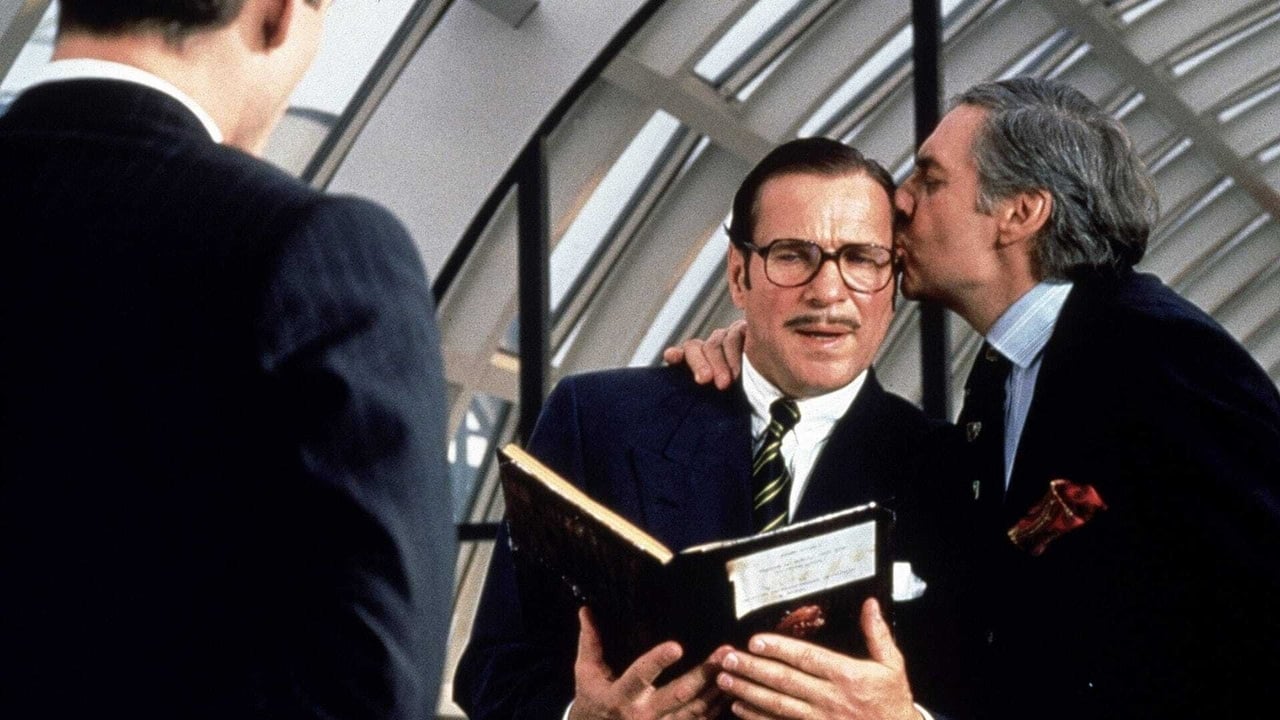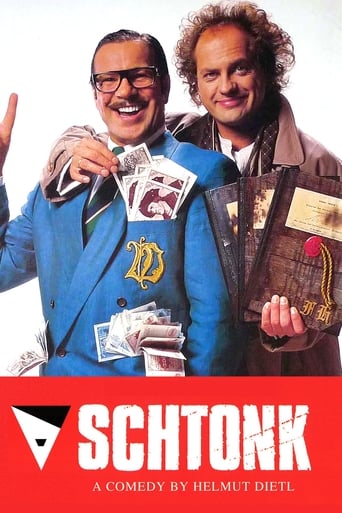Gurlyndrobb
While it doesn't offer any answers, it both thrills and makes you think.
Kien Navarro
Exactly the movie you think it is, but not the movie you want it to be.
Brennan Camacho
Mostly, the movie is committed to the value of a good time.
Bob
This is one of the best movies I’ve seen in a very long time. You have to go and see this on the big screen.
Horst in Translation (filmreviews@web.de)
"Schtonk" is a German movie that was released back in 1992, so it will have its 25th anniversary next year. The director is Helmut Dietl and he is also one of the pretty many writers that worked on the script here. This one was nominated for a Golden Globe and an Oscar and won also many other glories during all kinds of awards ceremonies. If you look at the cast, you will find so many known names if you have an interest in German cinema: George, Ochsenknecht, Ferres, Mühe, Hörbiger, Hoppe, Manzel etc. All you have to do is check the cast list to see who else is in here. No surprise to anybody should be that this film also received major glories at the German Film Awards, such as Best Picture, but also lead actor for George. And as a result, this is possibly the man's most known work today, just because of all the awards recognition. But it is just one great George performance from a stellar body of work. I cannot deny I am a fan of his and his performance here is one reason why. I am not sure if I would call it his best, but it's right up there with his finest.As for the other player, some are solid, some are not. The biggest letdown is once again (not surprisingly at all) Veronica Ferres, who simply isn't a good actress and with somebody else in her role, this could have been an even better film I think. It is still fairly decent though. It is about fake Hitler diaries and greedy ruthless authors and journalists who don't care about the truth as long as they become popular. A whole lot of this film is over the top, but it still works somehow and George going pretty hammy at times is even not a problem at all I think. Overall, I believe the late George and the late Dietl make it work. It is nothing you should watch if you are in for a historically accurate film, but there are some pretty funny moments and this film will make you shake your head on more than just one occasion and with that I don't mean because the film is absurd or unrealistic (it is intended that way for comedic purpose), but exactly from a positive perspective about how good of a satire it is at times. Yet there are weak moments and weak performances (not just Ferres, but she stands out negatively) that keep me from giving this an even higher rating and consider it one of the year's best. George elevates the material a lot and makes up for some of the weaker stuff performance-wise too or for an occasional length (not too many), but it's not enough for greatness.
thiloguntzel-198-106688
In reply to another review regarding the nonsensical title of this clever comedy: 'Schtonk' is a made-up word Charlie Chaplin used in 'The Great Dictator'. His angry "German" rant had this "word" in it, repeatedly. The plot of Schtonk is largely true to the historical events surrounding the alleged Hitler diaries discovered in 1983. If you're unfamiliar with those, stop reading now. The protagonists' name have been changed. Some literary license is taken regarding the journalist who sold the diaries to a popular German magazine. While it's true he was pocketing some of the money exchanging hands, his dating Nazi Hermann Goering's niece at that time is fictional. Also, the art forger who produced the "diaries" ended up doing time in prison, in real life. In the movie he escapes prosecution, accompanied by both his wife and his lover. This 1992 production has the whole elite of German actors of the time pull together to create a delightful screwball comedy. Its irreverence is reminiscent of Lubitsch's 1942 "To Be Or Not To Be'.
t_atzmueller
When the „Stern"-magazine, one of Germany's most influential leftist-liberal mediums, published Adolf Hitler's diaries in 1983, it had the same effect as if CNN would publish the secret sex e-mails of Abraham Lincoln: the diaries were as blatantly fake as a three dollar bill. The magazine, though still ever-present at German newsstands, never regained its reputation entirely and the view, if not trust, that the public had of journalism and media would change forever. Most readers were simply outraged, disappointed and only the most cynical eyes saw elements of unwanted and very 'brown' (the German synonym for fascism) humour.Director Helmut Dietl has picked up on this humour, having created a farce that remains among the best ever produced in Germany, a land not particularly famous (internationally speaking) for its comedies. It would have been easy for Dietl to poke fun at the "Stern" editors, their greed, corruption and arrogance that were revealed after the scandal but it would have been a cheap shot. Instead, Dietl created a social commentary, holding a slightly distorted mirror into the face of the viewer, forcing them to laugh at their own faults, follies and hypocrisy.The story is pretty much taken straight from the real-life events: Master-faker Fritz Knobel (Uwe Ochsenknecht) has an inspiration and, after producing fake nude portraits of Eva Braun for aging Nazis (by now disguised as historically interested businessmen), fakes Hitler's diaries, offering them to run-down and out of luck journalist Hermann Willié (Götz George). Willié haggles the diaries off as journalistic sensation to the editors of the newspaper "HHpress" ("Stern"-thinly-disguised). As the money rolls in, tension builds in the minds of deceivers and those allowing themselves to be deceived for the sake of profit; Knobel keeps producing more 'diaries', generally based on the authors own trivial daily life and general being (flatulence and halitosis). Inevitably the scam get's exposed for what it is: the media disgraced, Knobel and Willié make off like bandits, Knobel conning his way into Austria and Willié, either having lost his reason completely or in for one final con, feigning insanity, hijacks the former yacht of Hermann Goering, convinced that Hitler is alive and living in Argentina. (And if you're not convinced that the Fuehrer is alive and well and living in Argentina, then you haven't read enough conspiracy theories).Heart and soul of this film is the casting: all the actors shine, most of all George, best known in his role of tough-butt cop Schimanski and German synonym for 'machismo' in the 80's, plays a character to slimy, the fragrance of sweat almost permeates the screen. Ochsenknecht's features speak volumes, after seeing her in "Schtonk!", Christiane Hörbiger will forever be the a synonym as Nazi-niece and not to forget Harald Juhnke, in his lifetime known as both "Germany's Frank Sinatra" and "drunkard of the nation", playing George's crooked photo-journalist friend and, in comparison, one of the few voices of reasons in the film. Special credit should go to Ulrich Mühe, whose song and dance during the final part remains one of the films highlights. And, yes, even Veronica Ferres (who, when performing the role of Anna Frank in theatre, animated the audience to shout at the actors playing the Nazis, "she's hiding under the ceiling") could not ruin this film.If one can blame something on a film it may be that essentially only has one joke, which is the actual premise of the story itself and the triangle love-story of Ochsenknecht, Ferres and Dagmar Manzel, that adds little to nothing to the film and seems rather pointless. Also, if you're not familiar with German mentality, social structure and historic background (going back at least 70 years to a time which many Germans still don't want to talk to much about), a lot of the inside jokes will escape you. The movie isn't as international accessible as, for example, "Das Boot", and, if you're looking for a movie that will make you slap your leg every ten seconds: "Schtonk!" isn't "Airplane" or a Bob Hope film. Rather, it's a film that will make you smirk, perhaps even at yourself.Interestingly, the strange title of the movie isn't actually a German word (unless you pronounce it like „Stunk", which means trouble or bickering) since Charlie Chaplins „The Great Dictator" was never popular with German viewers. I leave it to the reader to figure out why but if the readers happen to be Polish or French, let it be said: no, just like us Germans, you didn't raised your right arm in protest either!
jan onderwater
Almost 2 hours is a bit two long for its basic story material, hence a film that has wonderful moments and scenes and plenty of satire, but also moments of boredom in which nothing (new) happens. Certainly successful in portraying the circumstances in which a forger could produce the notorious Hitler Diaries (it happened in 1983 and not only German press but the press world wide walked into the trap), the film shows that the yellow press and its sensation-hungry reporters made use of the curious fascination of the public world wide with the Nazi past.; as Harald Juhnke's character says to his chief-editor: "(with Hitler) we never had such a famous writer writing in our magazine ever before!".For Germany the most painful aspect of the film might be the support for the publication from former Nazis represented by a character played by Karl Schönbock (82 years old here!); as a former intimate friend of Hitler he knows that the diaries are forged but gives full support: the end justifies the means. One of the memorable scenes is the arrival of the guests at the rally of former Nazi's and supporters: a memorable image when the guests walk to the house in the rain under their umbrellas illuminated by torches.The cast is very good, with Götz George and Uwe Ochsenknecht outstanding. Both have scenes that are side splitting funny: George when he for the first time reads from the diaries and Ochsenknecht when he begins to think, talk and look like Hitler. But as said, the film is too long for its own good. There are more memorable scenes than the those I have mentioned already, but for instance does the viewer really need to see all 60 diaries made? The use of the old song "La Paloma" in the scene on the boat is a nice idea, but it also takes too long. And what to think of the first scene (before and during the credits); it does not add anything to the things to come and is not funny either.The for this film composed music itself is mediocre, but the use of recordings of Zarah Leander and that of a small yodel-theme are very clever. All in all: unbalanced, at moments very amusing and certainly worth a view.

